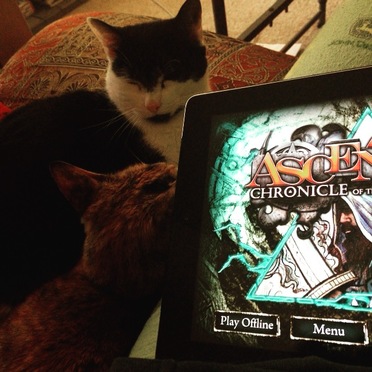 Maybe I don't play Ascension entirely by myself... Maybe I don't play Ascension entirely by myself... Although the new school year means a lot more social gaming with colleagues and students, I am still maintaining my solitary habits. One of my solo favorites at the moment is Ascension. I love both Magic: The Gathering and deckbuilding games, so it was inevitable that this game would become addictive for me. Ascension is a card game invented by two MtG Pro Tour champs, but it isn't a collectable card game like Magic. Instead, the game comes in one box and has many (many!) expansions that add layers of strategy. In Ascension, players acquire cards that are pulled from a draw deck and placed in the center row. The goal of the game is to be the player with the most honor at the end, and acquired cards either provide immediate honor when you defeat them or delayed honor when you calculate the value of your deck at the end. What is best for me, though, is that the solitary Ascension experience can be had in two forms, each of which is strategically different. I can either play a hard copy of the game with solo rules, or I can play on my iPad against the AI. Each is really playing solo, but the rules and resulting strategies are different enough that I get a lot more out of my game. When playing on the iPad, the game is more "traditional." The AI isn't brilliant, but it's good for learning and studying the cards. I can play with my own deckbuilding goals in mind, looking for card synergy and focusing on particular factions. In other words, the iPad version of the game mimics a real game with another human—and can turn into one if you want to play online. This is also a great way to get used to each card, especially since the app offers so many expansions. In a lot of ways, the official solo rules make Ascension more challenging. In solo mode, your "enemy" is guaranteed to acquire two cards per round—the two cards that are furthest to the right on the center row. Denying your shadow opponent any advantages forces you to acquire different cards in different patterns. Cards you might not normally be interested in—especially those that allow you to banish valuable center-row cards that you can't currently acquire for yourself—suddenly become hot commodities. True solo play is also harrowing because in the early game your deck is weak and you don't have much buying power. This usually turns the end of the game into a frantic attempt to catch up to your automated nemesis. As I get better at Ascension and come to know the cards and what they are capable of, I am glad that there are two ways to play the game by myself. Playing on my iPad helps me to hone my skills for when I eventually find face-to-face opponents, and playing the analog solo variant forces me to work my brain and exploit my cards in new and creative ways. Ascension is definitely a new favorite for me.
1 Comment
7/2/2017 10:52:24 pm
Your work is very good and I appreciate you and hopping for some more informative posts
Reply
Your comment will be posted after it is approved.
Leave a Reply. |
AuthorMy name is Liz Davidson, and I play solo board games. A lot of solo board games... Archives
August 2021
Categories
All
|
 RSS Feed
RSS Feed